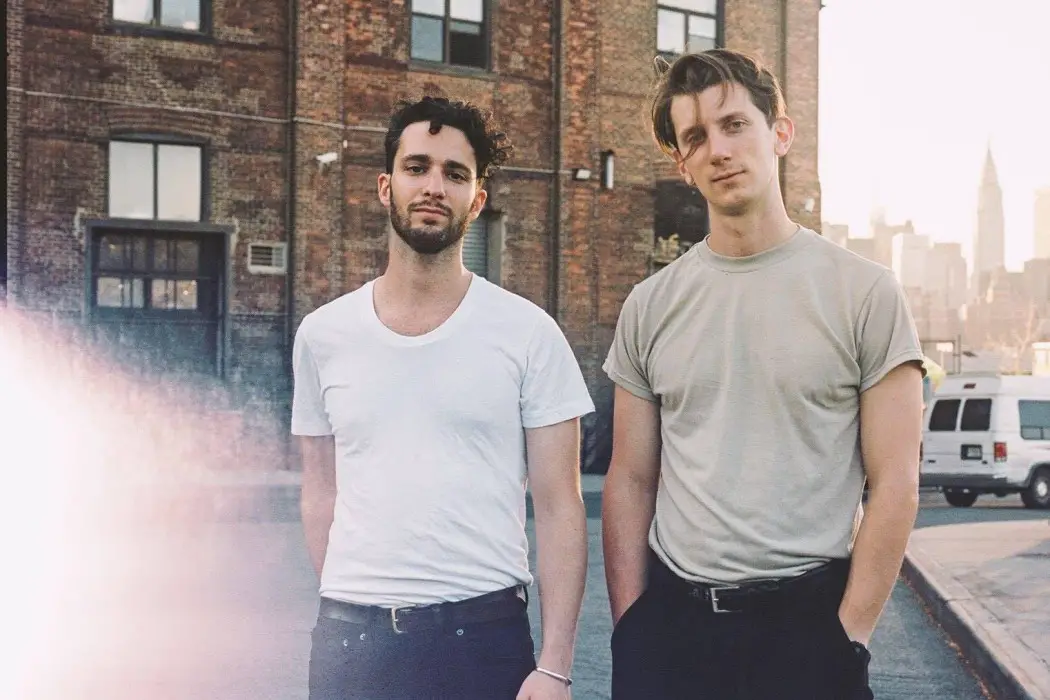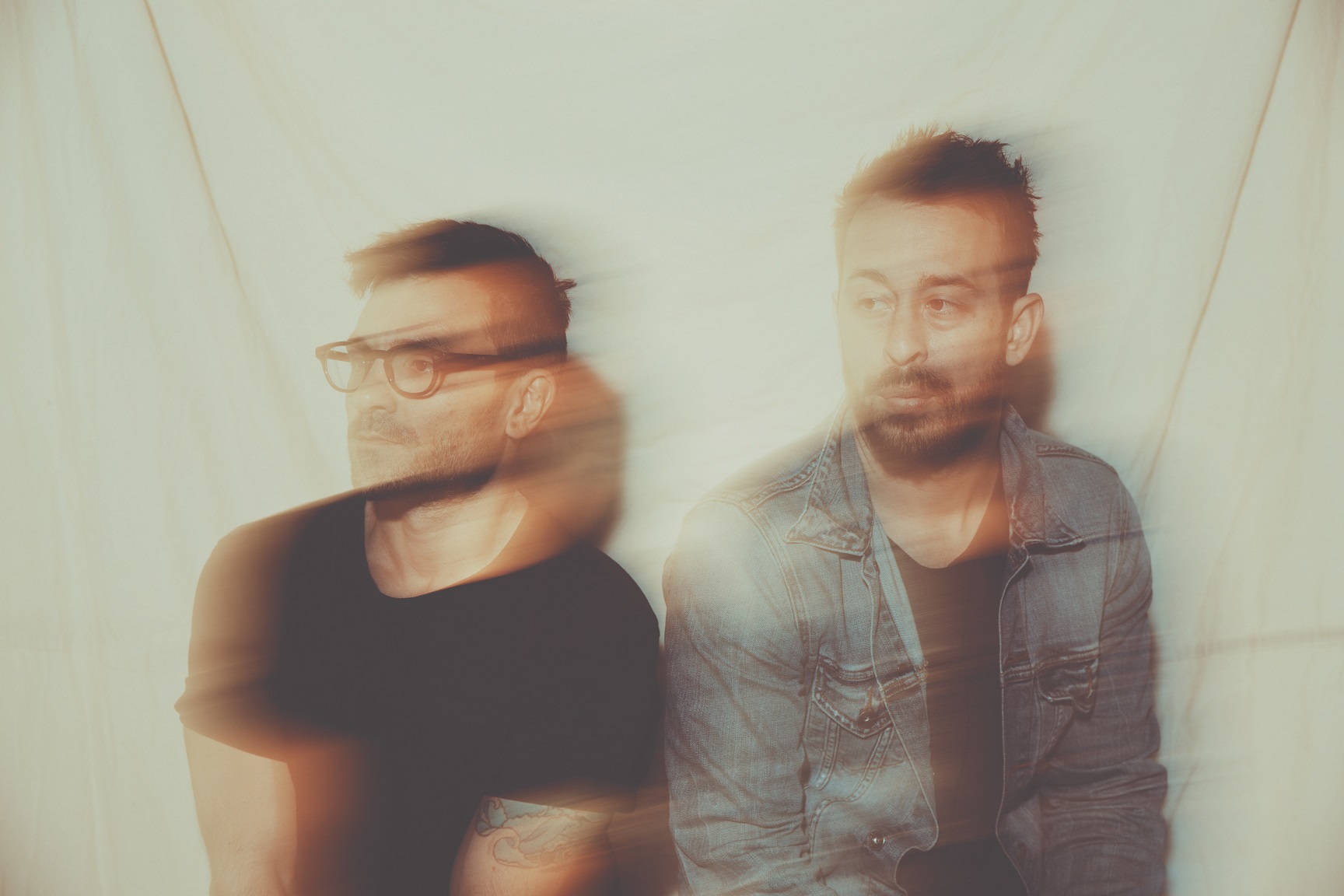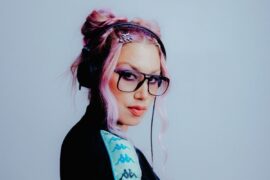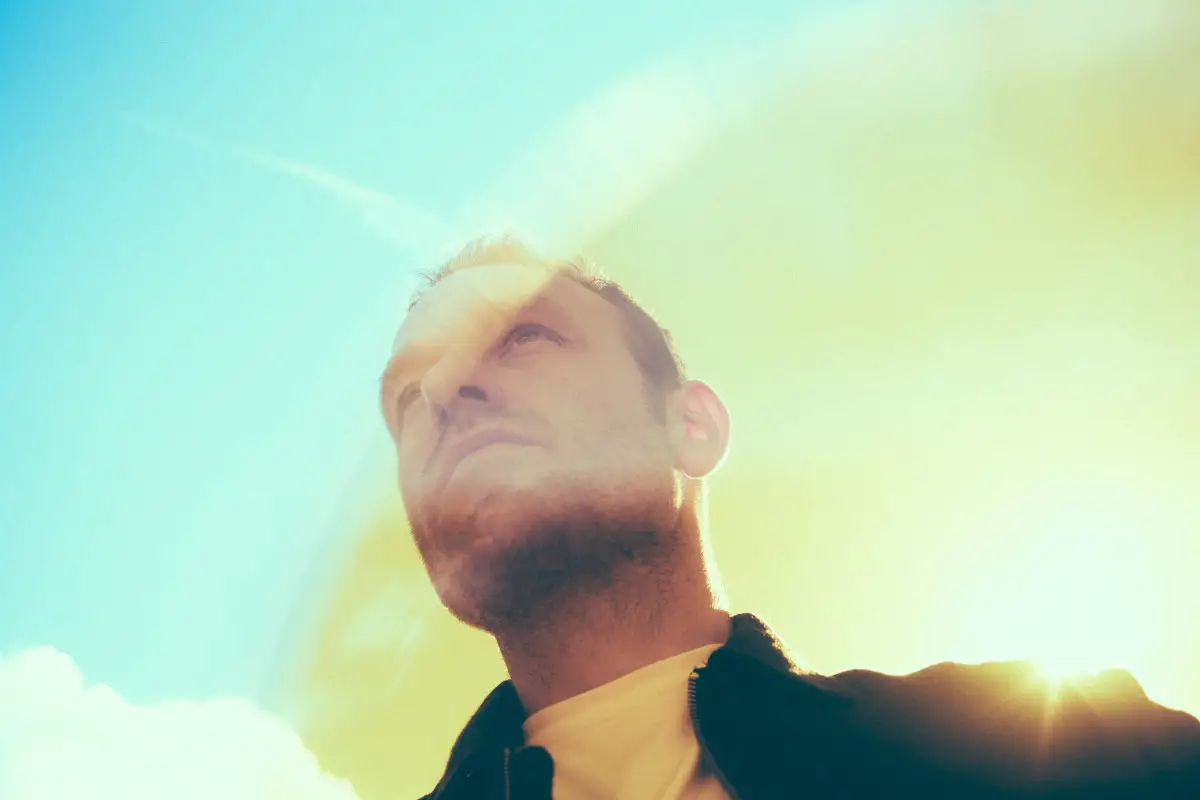We’re a very consistent band, and we all get up there and put out a decent amount of effort towards a song, and it doesn’t matter who’s out in the crowd. We’re playing this music together.
As a whole, music is a unique and diverse creative sphere in which self-expression is inherently key. Music is an outlet sought by everyone, both as a creator or consumer, and is definitively evocative. Artists know that they can and should acutely tap into this. Brooklyn-based band Surf Rock is Dead know that they can and should tap into this.
Surf Rock is Dead have carved out an intriguing niche within the indie music world. Their songs ooze a dreamy hypnotism and their technical ability is more than evident. They seem to draw from a variety of influences, but still successfully stick true to their own trademark sound. Surf Rock is Dead is palatable and full of promise, and deserve recognition for that.
Atwood Magazine recently chatted with the members of Surf Rock is Dead, Joel Witenberg, Kevin Pariso, and Jake Beal, at a recent show in Philadelphia. Self-aware and notably cool and collected, Surf Rock is Dead maintain an aura of erudite nonchalance that is both admirable and infectious. Throughout the chat, the band talked about everything from their songwriting process, their diverse upbringings, and why being “popular” doesn’t necessarily matter in the long run.
Watch: “Never Be The Same” (VHS Sessions) – Surf Rock is Dead
A CONVERSATION WITH SURF ROCK IS DEAD
Atwood Magazine: Your most recent single, 'In Between,' is so awesome. I love it. Do you have any plans to release a full-length soon? What’s the plan for new music?
Kevin Pariso: We have an EP, it’s pretty much done.
Joel Witenberg: It’s done. For all intents and purposes, it’s done.
Kevin: So, we’re just going to release a couple of singles leading up to the EP. But yeah, it’s done, and we’re excited. It’ll be good to get some new music out.
Joel: There will be a vinyl as well, I think; we’ll probably have a double-sided vinyl that’ll probably be our old EP and this EP. Maybe a full-length in a year?
Kevin: That sounds realistic.
That’s a good goal to have! Are you happy with the new music? Is it different from your older stuff?
Kevin: I mean, it’s only our second EP, so of course we didn’t want to be radically different. But it’s slightly more in-depth, and slightly more nuanced.
Joel: Also, Jake [Beal] did the drums on the whole EP, which he didn’t on the previous one.
Jake Beal: Yeah, it’s more fluid, more cohesive, maybe?
Kevin: Yeah, also because the songs were recorded closer in time together. Whereas with the other EP was kind of made as singles, recorded single-shots over time. And this one, we knew what we were doing.
Jake: We’ve also been playing most of the songs live for a while.
Joel: For a little bit, yeah.
So you knew kind of how you wanted them to sound and work out.
Joel: Yeah, we had a rough idea. I mean, it’s always — when you go to the studio, you never really know what’s going to happen.
Kevin: I think it’s not a good creative mentality to go to the studio and be like, “We’ve been playing the song like this; we’ve got to get it just like that.” There’s always weird, crazy, happy accidents that happen.
Joel: Yeah, just try stuff.
Listen: “In Between” – Surf Rock is Dead
[soundcloud url=”https://api.soundcloud.com/tracks/295164920″ params=”auto_play=false&hide_related=false&show_comments=true&show_user=true&show_reposts=false&visual=true” width=”100%” height=”150″ iframe=”true” /]Do you have a song -- not just from the new EP, but any of your songs -- that have any special meaning to you? Do you have a song - not just from the new EP, but any of your songs - that have any special meaning to you?
Joel: Well, what do you mean by “special?”
Is there a song you perform or listen to and you automatically feel something different from another song that you play or listen to?
Kevin: I mean, each song is going to pull a different feeling.
Joel: I maybe get that a little bit with “Anymore.”
Kevin: I hear that. For me, it’s probably the song “Late Risers.” I mean, we both share lead vocals. He [Joel] is mostly singing on “Anymore,” and I’m mostly singing on “Late Risers.”
Joel: I’d say it’s pretty even on “Anymore.”
So it’s more about which one you’re performing, rather than overall?
Joel: Sometimes.
I think everybody will say that everything in their lives influences their music.
Is there a certain lyric you have that you feel more strongly about?
Joel: Yeah, the lyrics in the chorus of “Anymore,” I wrote those. And Kevin generally will write his own lyrics, and I’ll write my own, and then we’ll just bring them together. But then that means that there are going to be specific lyrics which mean different things. But generally we’ll go for an overall meaning for the song, and then we’ll both like, come together.
Kevin: Or even if I don’t write it, but just say it — we can pick up on each other, for the most part.
Joel: And sometimes, it only requires one of us.
Kevin: Yeah, it all just happens pretty naturally.
That’s good! That’s a good way to organically come together. When did you guys first start making music? When did you know that you wanted to make music?
Joel: When I was like, 10.
Kevin: Oh, I thought you meant together.
Well that too! I want to know individually, and then together.
Kevin: For me, I think I was twelve. I always wanted to play the drums, because as a kid I was always [tapping], and beating on things. Then one Christmas, I opened up all of my presents, and my dad was like, “There’s one more thing…” And it was an acoustic guitar, hidden behind the tree. I remember trying to play it and thinking that the guitar was so hard, but later I realized it was because he had bought me the cheapest guitar possible. The strings were like, an inch away from the fret board. And now every time I go home to my parents’, I never play it, because it’s impossible. I don’t touch it. How was I supposed to learn guitar with that?
Joel: That’s the funny thing with instruments — the cheaper they are, the harder they are to play.
Kevin: No, that makes sense, because there’s no quality that went into making them.
Joel: Right, but they’re aimed at beginners. That’s the whole thing.
Kevin: I don’t know, I just thought it was a really fucking hard instrument to play.
Joel: When did you start to play, Jake?
Jake: Well I got my first drum kit when I was 11, I think. And…yeah, they were a piece of shit.
Kevin: But with drums, you can just hit them!
Jake: But there’s so many variables though! So that was given to me or whatever in that original kit. But once I could go to the music store, and pick out what I wanted, that’s when I feel like I became a musician, because I was choosing the sound I wanted.
Did you always want to play drums?
Jake: Oh hell yeah.
Kevin: I feel like every kid either wants to be a singer or a drummer, and then that’ll slowly turn into something else.
Jake: Well my dad played guitar, and I’d pick up his guitar when I was younger, but he got me a pair of drumsticks when I was ten years old, and that was it.
Joel: Yeah, my first drum kit was the old drum kit from my school that, for some reason, was all fucked up, and everyone had kicked all the heads in…so I brought them home, and as a ten year old, fixed the whole thing up.
Jake: I remember getting new heads for my “beginner” drum kit, and it was a big deal.
Joel: That feels like a whole other planet.
Jake: Oh yeah.

But that’s awesome! So, you guys are kind of all over the place - Melbourne, Chicago, Miami - but now the home base in Brooklyn. All of those locations are very different, so how has each place inspired your music? Or has it at all?
Joel: I think everybody will say that everything in their lives influences their music.
Kevin: I don’t know if I had grown up somewhere else, how different it would have been in terms of what I was listening to as a kid. We live in the post-internet age, and so in high school I was listening to a lot of the Brit Rock stuff, The Libertines, Arctic Monkeys, and I saw Arctic Monkeys when they came to Chicago, but that’s not really like, a “Chicago” thing.
Jake: But you were in a big city, where they would’ve showed up.
Kevin: Good point.
Jake: You know, nobody came to south Florida. To come to Florida is a pain in the ass.
Well, what were the music scenes like?
Joel: Melbourne had a very vibrant music scene, and it was very varied. Everything from very improvised music, through to rock music. Especially because Melbourne had quite a history of rock music, because it’s like, a real working-class city. So bands like AC/DC were in Melbourne; through the 70s and 80s there were a lot of bands from Melbourne. That sort of continued, and as a kid, that was present. I think it’s changed a lot, from what I hear, since I’ve left.
Kevin: I feel like I didn’t go to a ton of shows, but when I was in high school, I feel like there were a lot of kids who were really interested in really hard punk stuff.
That’s such a high school thing.
Kevin: I had no interest in it. It was not for me. But it was cool, because Lollapalooza is a Chicago-based festival, so that was always amazing to go to. And I’d always kick myself after I’d go, years later, because I would see all of these bands that I’d love after-the-fact, that I completely didn’t know of or care to see when I was actually there.
That’s the whole festival vibe; you’re going to see so many people, whether you know them or not. You’re just there for the music.
Kevin: Well, I feel like most people aren’t anymore.
Joel: It’s been a long time since I’ve been to a festival as an attendee
I’ve only ever been to one, I think. And moving on to your name, 'Surf Rock is Dead' - that just basically diminishes the idea of a 'genre' altogether.
Kevin: That’s kind of shitty, huh?
How dare you! Do you have any influences that you draw from, or do you have a 'genre?'
Joel: I think that’s one thing that we always forget about. We never talk about Animal Collective, and that’s one band that really is a huge influence to us. I think about their sound, and I feel like we just always forget that.
Kevin: But even if like, somebody listens to us, and they’re like, “Well that doesn’t sound the same at all,” because they have like, crazy rhythms and stuff like that, but we really just like their music a lot.
That counts as an influence!
Joel: We all like a lot of stuff. Jake’s really hard into metal — do you still play in that metal band?
Jake: I do, but I don’t really listen to metal anymore.
Joel: Sometimes I’ll listen to metal, you know. Sometimes we’ll listen to metal in the car, and Kevin will just zone out.
Kevin: I’m cool with it for a little while.
What’s your go-to?
Kevin: The UK label PC Music, I like their stuff. I think it’s really weird and different, but I’m into it. And I can totally see how it can be fucking annoying, and I completely understand that.
Everybody has their tastes, and that’s fine!
Joel: For me, it’s a time and a place thing. If I’m feeling it, I’m going to put it on.
Listen: “Late Risers” – Surf Rock is Dead
[soundcloud url=”https://api.soundcloud.com/tracks/187120682″ params=”auto_play=false&hide_related=false&show_comments=true&show_user=true&show_reposts=false&visual=true” width=”100%” height=”150″ iframe=”true” /]Yeah, yeah. So do you think you have a genre?
Joel: As a band?
I mean...or as a person?
Kevin: I mean, we definitely do.
Joel: We are “surf-gaze.”
Surf-gaze...how ironic.
Joel: That’s not ironic! That’s real!
'Surf Rock is Dead' … 'Surf-gaze' … sounds very ironic.
Joel: Okay, yeah, I guess it kind of is ironic.
Kevin: I mean, I guess if there’s a Spotify playlist that has “indie” whatever on it, we would qualify for that.
It’s not necessarily a “genre” thing. It’s more about the sound that is created that is what is appealing.
So you qualify as 'indie,' okay.
Kevin: Totally.
Joel: We’re a real “indie” band.
Kevin: We qualify as “indie” because we’re an actual “indie” band. We don’t have a label.
Joel: We do it all ourselves. We’re “independent.”
Kevin: People say that there’s a new-wave vibe, because of the reverb. But I’m kind of turned off by that, because of the new wave vocals. The really British, new wave-y vocals kind of ruins a lot of that for me. But I totally get why we get thrown into that category. I’m not delusional.
You’re very self-aware.
Kevin: When I have to, I can be.
Joel: It’s hard, because the sound, generally, is a lot of reverb. That’s like, a “thing” that we like. It’s not like, “Oh, let’s just throw on a reverb,” it’s more about creating textures.
Listen: “Anymore” – Surf Rock is Dead
[soundcloud url=”https://api.soundcloud.com/tracks/219014327″ params=”auto_play=false&hide_related=false&show_comments=true&show_user=true&show_reposts=false&visual=true” width=”100%” height=”150″ iframe=”true” /]It makes you unique, too.
Joel: Yeah, so, that’s an appeal for us. It’s not necessarily a “genre” thing. It’s more about the sound that is created that is what is appealing. And to some degrees, it’s almost random. You put a reverb on something, it’s completely random. It’s not going to be the same every time.
Are you trying to evoke anything specific with your music, or is it kind of like, whatever happens, happens?
Kevin: I don’t know. I don’t know if we’re trying to create some specific emotional reaction from anybody, but I think that we just like to write stuff that is full of riffs and hooks, rather than writing a chord progression and singing over it.
Jake: We do stuff that we like to listen to.
I’m sure you’re going to create something that you will also enjoy.
Joel: In that sense, I feel like you [Kevin] are right — a lot of guitar music is people just having chords and singing over them. But what we do is actually more of an electronic music approach, where it’s like, you’ve got musical rhythms, and you’ve got melodic ideas, and then we create everything on top of that. You know, I’ve never really thought about that until now.
I would hate to feel like, no matter how “popular” we get, or whatever, that we weren’t content.
Well there you go! A whole new perspective! And you’ve got a pretty decent following; you’ve gotten a lot of recognition on Hype Machine, and other online spaces, but do you think that you find it difficult to establish yourself on a larger, more 'mainstream' scale? Does that matter to you, do you care about it?
Kevin: It would be difficult for us to just try and do that “mainstream” thing with our current sound. I don’t think that’d be possible for us, to have an aspiration to be in the Top 40 and not change what we’re doing. I don’t think that’s realistic. I do think that we could have a larger presence in the indie blogosphere, and of course as a band we always want to grow and have more of a fan base, but we just want to write the stuff that we really like, and that inspires us, rather than trying to change to become “more popular.” If that does happen, we better love what we’re doing simultaneously.
Joel: I think the ultimate goal is that you can make the music and sustain yourself on the music. It doesn’t necessarily need to be “mainstream,” but we need to be able to do what we do musically, and still be able to pay our rent, which is difficult.
Is this what you do full-time, 100%?
Joel: No. I mean, I still work in music, but Kevin doesn’t.
Kevin: I rent people homes.
Joel: I’ll tell you what, I wish I was renting houses right now. Music industry is a tough place to work in.
It is! I mean, it’s always going to be hard to really be able to do it full-time, unless you are that mainstream. Do you think, then, that success can be measured?
Joel: That is a very, very interesting question, because that is something that I ask myself often. When is it enough? What specific element are you going to be like, “Oh, I was successful!” What defines that?
Kevin: There’s so many things — it depends on what you value.
It is subjective!
Kevin: Completely. Like, even most billionaires always want more. The reason they’re billionaires is because they’re always hungry, and that’s how they got there.
Jake: It’s all a game.
Joel: It is a game!
Kevin: I’ve realized that these people have an insatiable hunger, and that’s why they’re there. I’m trying to apply that to us with music, and of course I want to get to a point where I am content and happy and feel successful, but at the same time, I would still want to be able to grow. I would hate to feel like, no matter how “popular” we get, or whatever, that we weren’t content.
What is your favorite part about what you do with making music?
Kevin: Probably all the really cool, spontaneous things that you wouldn’t really suspect.
Joel: I think so. I was going to say playing live — and that’s great — but I think the spontaneous jamming stuff, that’s where you get the most joy and fulfillment.
What’s the weirdest experience you’ve had, being musicians?
Kevin: I was in another band, and we were playing a show at The Knitting Factory in Brooklyn, and the keyboard guy — he’s like the nicest, quietest, most easygoing dude — is playing, and this girl runs on stage, and just starts punching him over and over again. And I’m looking at it happening, and I’m cracking up laughing, and she’s wailing on him.
Joel: But why?!
Kevin: And then her sister runs on stage and pulls her down, and after the set I asked what was going on, and he was like, “Dude I don’t know, this girl just got up to the front and was like, I’m gonna kill you.” And she ran up and just started punching him! And if it had been a strong dude, I probably wouldn’t have laughed and would’ve tried to help, but the fact that he was able to continue doing what he was doing as someone was punching him, I just thought it was so funny. It was so weird. And people thought it was a stunt that we did — but it was literally just a crazy person who ran on the stage.
Joel: Jake, you’ve played some weird shows — surely you’ve had some weird shit happen.
Jake: Oh I don’t know, that’s a tough question.
Joel: I’m trying to think about that, too. I don’t know.
We’re a very consistent band, and we all get up there and put out a decent amount of effort towards a song, and it doesn’t matter who’s out in the crowd. We’re playing this music together.
That’s fine! So this might be a very broad, general question, but why does music matter to you?
Kevin: Yeah — yeah that’s a pretty good question. Sometimes, I feel like pursuing music feels like a really selfish thing to do, because there’s so many other things you can do in your life.
Joel: Totally. And people are always like, “But you’re giving something to people that they can enjoy!”
Kevin: That’s true. And I mean, it sounds very surface value, but there’s definitely been people who have reached out to us and have said, “I started a band because I heard your music,” and things like that. So that’s really amazing, and that’s cool. I think music will always be around. Somebody has to make it.
Absolutely! It’s important - it’s very important.
Kevin: You know what I mean? It lifts people up, or it can bring people to an “artificial” down, or they can feel “down”in terms of relating to other people — so it’s like, a good kind of down. Which is healthy, I think.
Joel: I think also, for me, making music that connects with people is like, a big part of the appeal. I’ve been in bands where I felt like we didn’t connect with anyone, or it never sat right. And that just wasn’t fulfilling for me. I want to know the people who are going to enjoy what I’m giving them.
Kevin: And “connect” doesn’t have to mean lyrically, it could just be the melodies, or just the whole thing in general.
Have you found this whole experience, with Surf Rock is Dead, has been pretty positive?
Joel: Definitely.
Kevin: I was going to say definitely.
Joel: Jake is always surprised with this band. Jake plays in a few bands, but we always play reasonable — so like, as an up-and-coming band, it’s very probable that you’re going to play shows where there’s nobody there, or very few people, or whatever, but somehow we’ve managed to just not do that.
Jake: We’re a very consistent band, and we all get up there and put out a decent amount of effort towards a song, and it doesn’t matter who’s out in the crowd. We’re playing this music together.
Joel: I think the one time we played to an empty room — it was only once — and it was the one time my parents were visiting New York, and we were playing to this empty room in Williamsburg.
Kevin: But it was an early show! We went on at like, 7 o’clock.
Joel: We were like, “Why did we agree to this?”
Well I guess this brings me to my last question - what is one thing that’d you like to see happen in the music scene, that’s not currently happening, or could be improved?
Kevin: The first thing I thought of — we’re in this weird limbo in the transitioning of the industry into streaming, so I’d like to see that adjusted to fairly compensate artists. There are artists who are getting millions upon millions of plays, and they’re obviously making money, but it’s not in proportion to what it should be. People just don’t want to go out as much — which is completely fine, it’s myself included — to go and buy CDs. They want to stream, but the artists should be compensated fairly. They’re still trying to figure out that sweet spot, that’s just not there.
Joel: I think I probably agree with that. I think I’d like to see the eradication of CDs.
Completely?
Joel: Completely. I think it’s a fucking useless medium, just get rid of it. Let’s distribute the money appropriately across the digital media that isn’t CDs […] It’s like, you have a pie, and everyone takes a piece of the pie, and then there’s nothing left for the artists. So my feeling is, fuck everybody else, let’s just give everyone the music for free, and we’ll deal with it elsewhere.
It’s just interesting, how we’re all moving on in this digital age.
Kevin: I’m totally down with that, because less physical goods means less resources used. I wouldn’t really care if there weren’t any tapes or vinyls in the future.
Vinyl is going to last forever, though.
Joel: …I don’t know if I agree with that.
Oh no?
Kevin: I mean, sure. But like, if there’s a way that you can just make something digital, then you’re not having to take resources from the earth to make them.
Joel: I don’t think vinyl will be around forever, because it’s a physical medium, and I think eventually over time people will not want to have those physical things. Everyone’s lives will be in The Cloud.

As we move forward in this new musical age, it will be imperative for artists and audiences alike to work harmoniously together in order for it to continue thriving as a universally admired artistic medium. Surf Rock is Dead have succeeded in attaining an artistic niche through which they can wholly connect with their audience, and will ultimately forge new and exciting musical paths that will allow for them to continue to grow and evolve. Surf Rock is Dead have simultaneously given new meaning to and diminished the idea of a genre through their craft — something that will be a unique necessity in the musical future. Surf Rock is Dead, but you shouldn’t mourn about it.
Connect with Surf Rock is Dead on
FB, Twitter, Insta
Discover more new music on Atwood’s Picks
photo: SRID © Jacqueline Harriet









